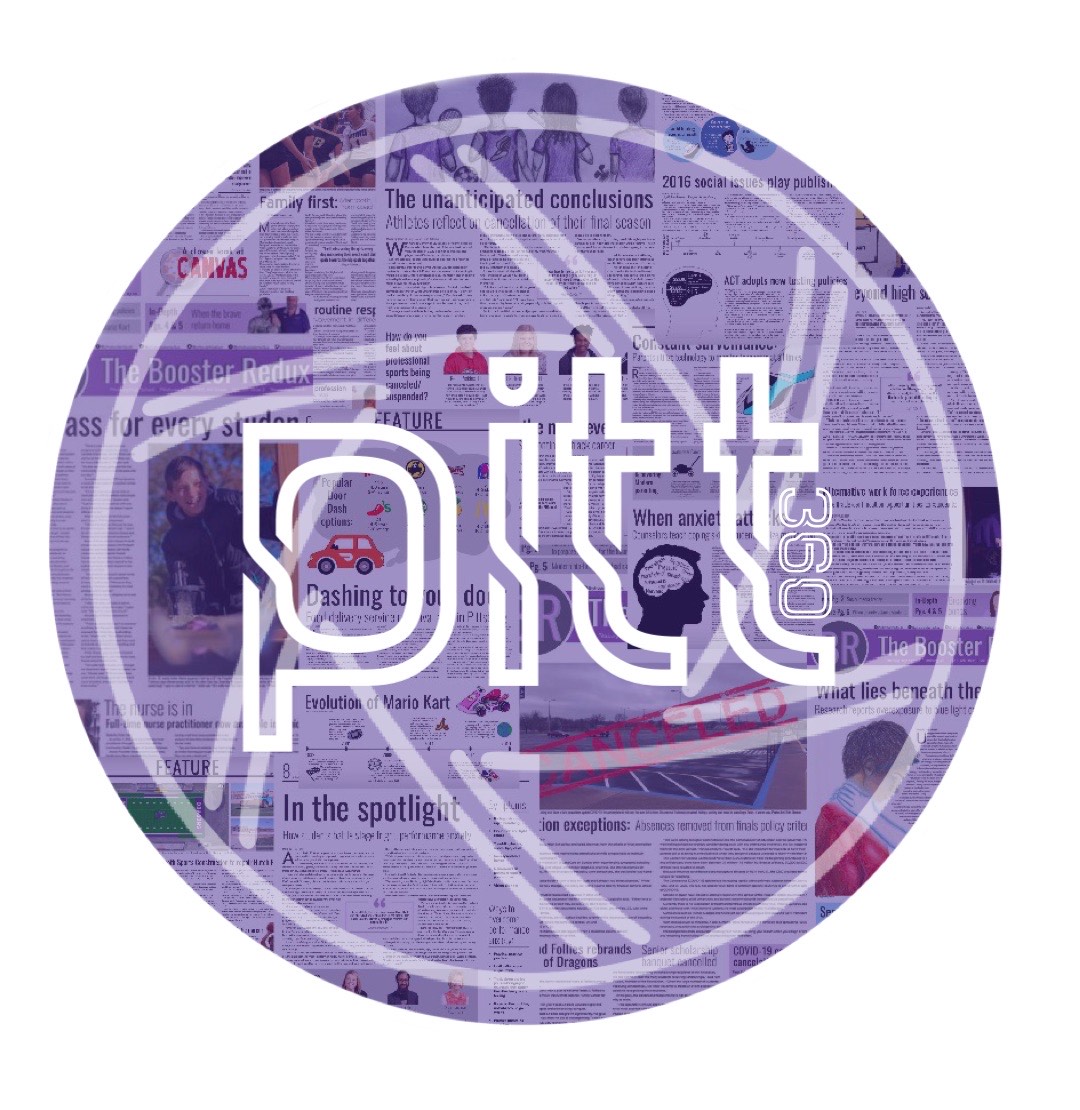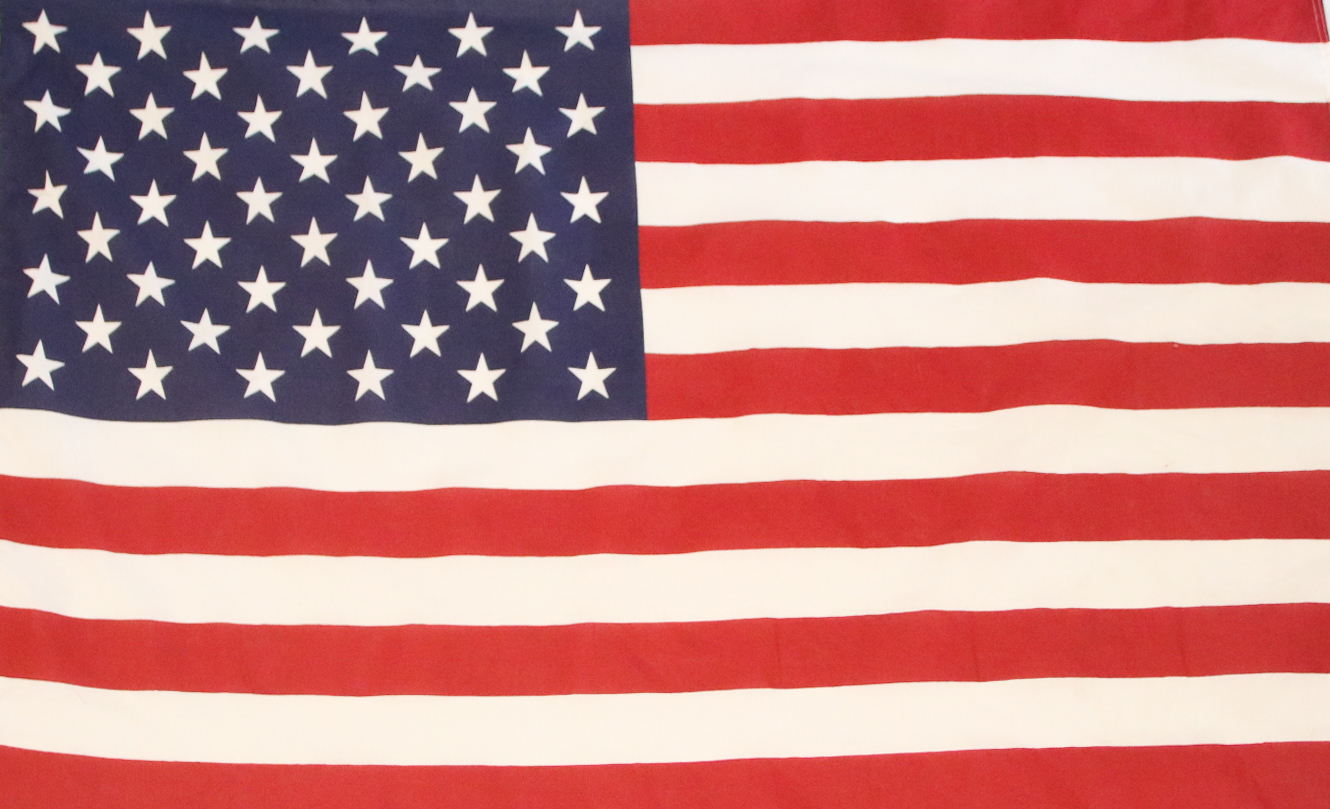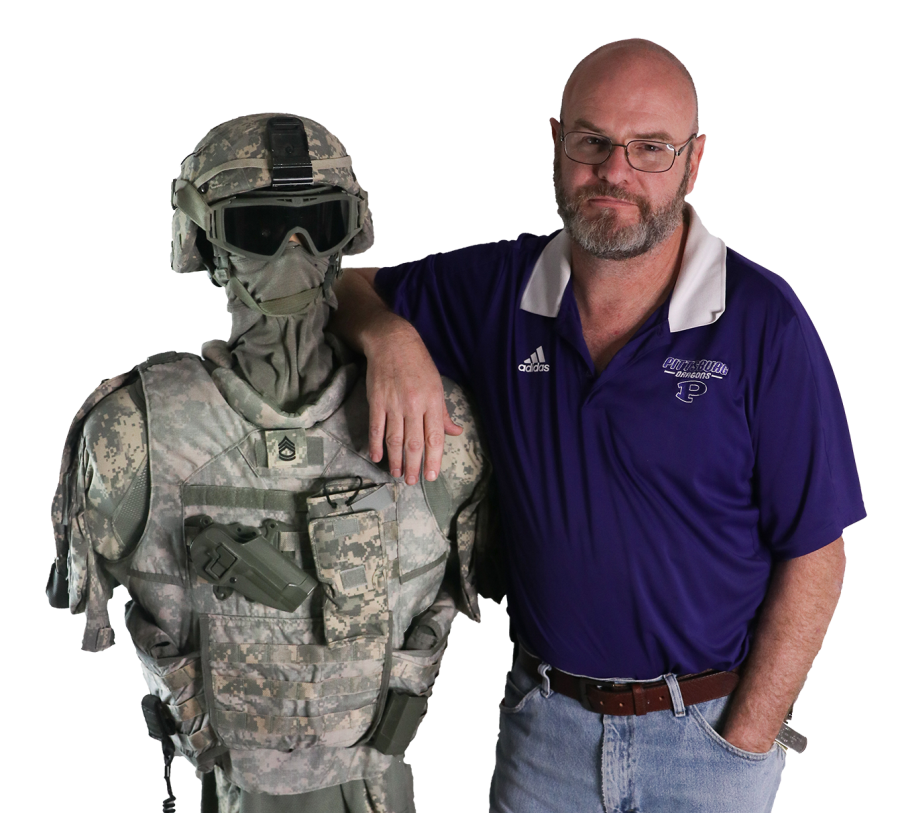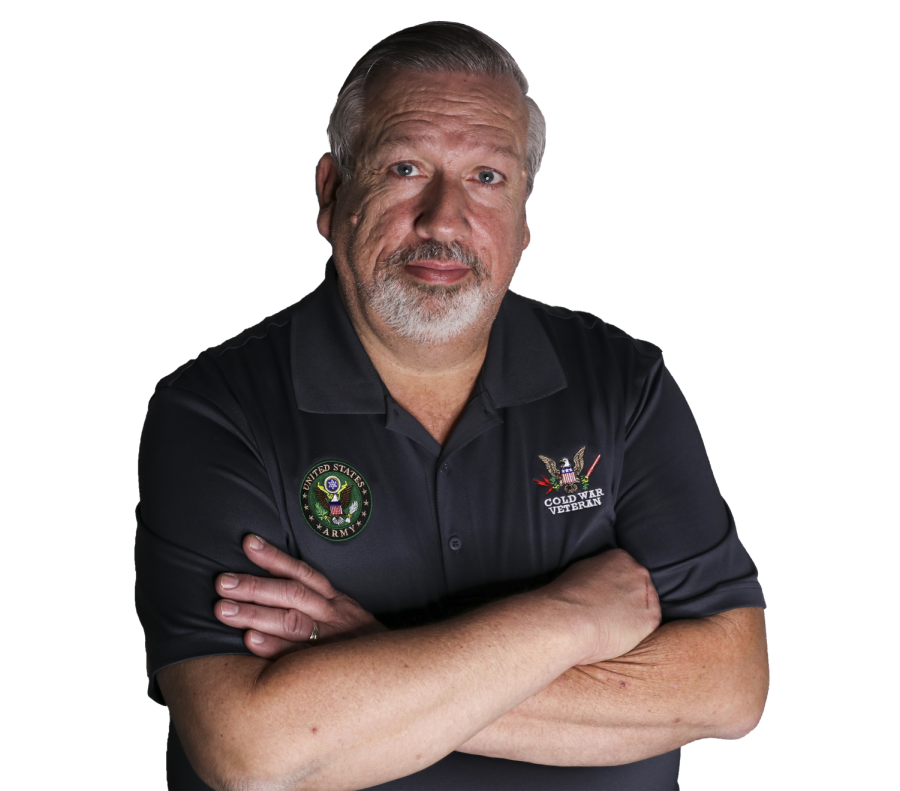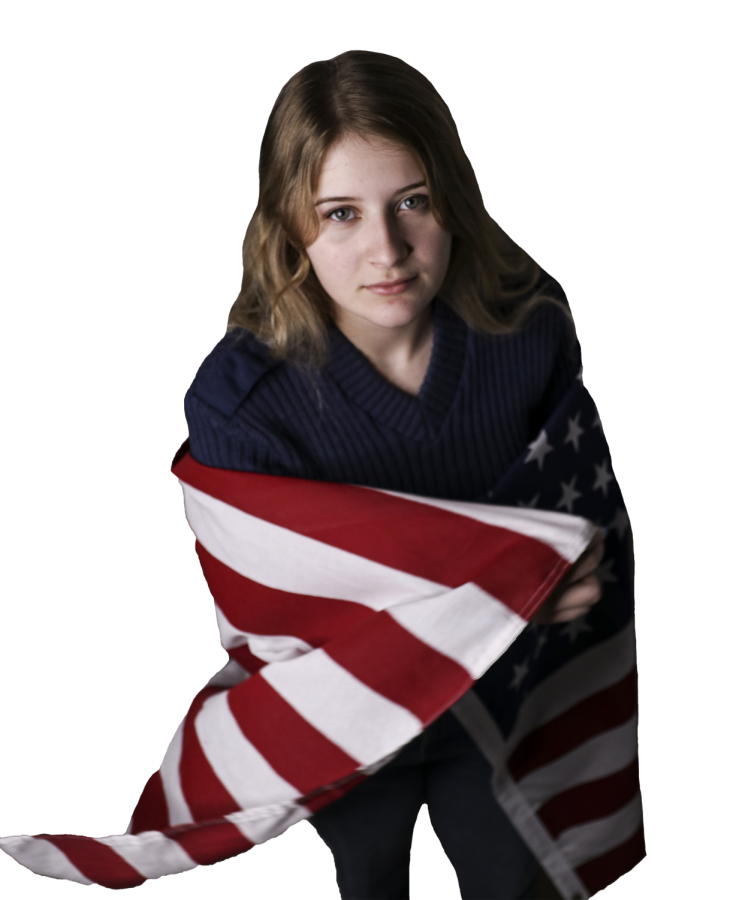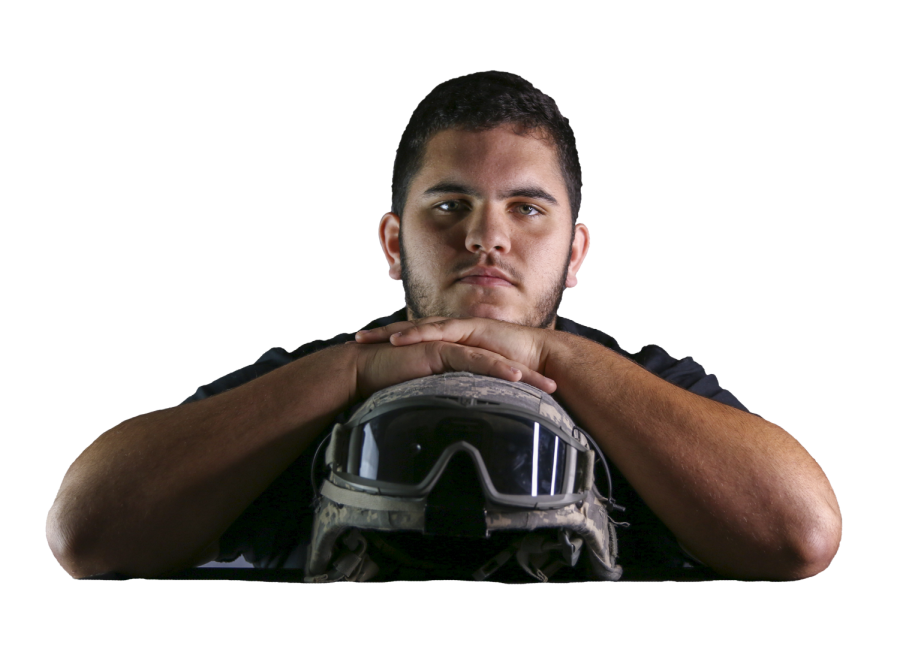Your donation will support the student journalists of Pittsburg High School - KS. Your contribution will allow us to purchase equipment and cover our annual website hosting costs.
When the brave return home: the aftermath of active service and those left behind
November 15, 2019
An American flag drapes over a wall. A mannequin is dressed in fatigues and battlefield gear while the corner of his office is decorated with pictures of comrades and memories from his time of service in Iraq and Afghanistan.
Chuck Boyles, teacher and technical theatre director, sees the 22 years he served as a civil duty.
“We actually have people who have served in the military here in the school who might want a little less notoriety because they felt that they were just doing their jobs,” Boyles said. “I know it’s sometimes difficult, it’s difficult for me to be the center of attention on [Veterans Day]. You kind of feel like a lot of eyes are upon you.”
Gary Wolgamott, social science teacher and army officer of 12 years, says Veterans Day has been depreciated.
“[Students] have grown up in an environment in which we have been at war somewhere continuously. And so therefore, it has become a routine part of our society,” Wolgamott said. “Second thing is that I think we tend to like to be positive. And to think of fighting and people dying, we tend to like to kind of compartmentalize that off to the side.”
In 1938, Armistice Day was passed as a national holiday to commemorate the anniversary of World War I’s conclusion. Armistice Day would eventually be labeled as Veterans Day to honor all veterans, living and dead, who served during peace or war time.
National Honors Society (NHS) and Wolgamott, organization sponsor, organized this year’s Veterans Day assembly to honor local veterans.
In preparation for the assembly, NHS reached out to veterans in the community in addition to veterans in the school. Each veteran had a student escort for the assembly, was recognized by name and was invited to attend a reception after the assembly.
“The purpose [of Veterans Day] is to recognize those individuals who have served above and beyond their normal duties as a citizen to defend, or to protect our freedoms and civil liberties,” Wolgamott said. “It’s just like Fourth of July. How many kids grew up thinking it’s firecracker day with no true understanding of what the Fourth of July really stands for? We see a parades and we see all sorts of stuff and the TV channels show all kinds of movies, but we really don’t address the true meaning of Veterans Day.”
Junior Blake Harrison says his father’s time of service in the National Guard has taught him to respect the holiday.
“To me, [the most important thing] is appreciation. All of the modern things that we have, we probably wouldn’t have right now if we didn’t have people fighting for us,” Harrison said. “It’s just crazy that people were dying every day for people like us, everyday people, who don’t really acknowledge the fact that there are wars going on.”
Every year, junior Rose Scott observes Veterans Day alongside her parents, who are both veterans.
“Patriotism isn’t just agreeing with everything that’s happening in the United States,” Scott said. “It’s fighting for a better United States. It’s fighting for democracy and fighting for freedoms and fighting for equality, and not just equality in the sense of equality in the government, but also just disagreeing with the government when something is wrong.”
Wolgamott encourages people to remember the purpose of the holiday.
“I probably hear it probably 50 times a week or so, I’ll have somebody say ‘Thank you for your service’ and I think that has become a catchphrase. We don’t know how to express ourselves to veterans,” Wolgamott said. “The big thing is, be sincere. Most veterans that I’ve talked with aren’t expecting to receive a lot of recognition. So we need to step forward and we need to develop a better understanding of Veterans Day and what it means.”
Chuck Boyles, Army National Guard veteran
I served in Kansas Army National Guard for 21 years and 11 months to be exact. I started here in Pittsburg, just with the unit, which was Alpha company of 891st…My family did not have the resources to help me out very much for college. They did their very best, but it was still not enough.
I convinced my parents that the GI Bill would be a good means for me to go to college. Plus, there was an enlistment bonus. There were additional incentives while going to PSU to minor in military science, so I took advantage of that. And they’ve really helped me along to accomplish some things and otherwise, I wouldn’t be able to do.
While going to PSU, I went ahead and became a commissioned officer. They gave me the opportunity to become a heavy equipment operator. Then, I also got an occupational skill in carpentry.
Result, I served two tours in Iraq when our unit was activated, and then [was] called up for a separate unit to go over as a police advisor to Afghanistan. Retired in 2010. I think [students] are very well informed [about the importance of Veterans Day].
I think that sometimes there are veterans who are very quiet and modest. We actually have people who have served in the military here in the school who might want a little less notoriety because they felt that they were just doing their jobs. I know it’s sometimes difficult, it’s difficult for me to be the center of attention on that particular day. You kind of feel like a lot of eyes are upon you.
I think that there should be a teachers’ day, really. Teachers do amazing things day in and day out. And we could probably say the same thing for law enforcement, first responders, firemen. There are a lot of people who I think don’t get the appreciation that they deserve.
[On Veterans Day], I try to spend time with my fellow veterans here in Pittsburg at the American Legion. Sometimes though, we just may wish each other happy Veterans Day on social media. If at all possible, we’ll meet each other in person. [Throughout my time of service] I’ve had very, very fond memories, but I’ve also had some frightening memories. The fond memories mostly come from spending my second tour with [my team]. Really, really good friends, close like brothers.
That particular tour, our job was to look for roadside bombs. And we found a lot but a few of them found us. But other wonderful memories were traveling to countries like Armenia, and helping the Armenians remove landmines from their borders with Turkey and Azerbaijan so they can return them back to farmlands.
There are scary memories, and it’s all kind of a big mixture of things over those years. Happy Veterans Day, and let people know that sometimes the best Veterans Day we can have is just a one-on-one thank you by handshake.
Gary Wolgamott, former Army officer
I served as an army officer for 12 years in the infantry. It would have been starting in 1977 through 87 and I’m still in the inactive reserve today.
I volunteered through the ROTC program at Pittsburg State University and received a commission as a Second Lieutenant. I think I served because it was an opportunity for me not only to give back to the country that’s given me so much, but more importantly than that, I think it’s an opportunity for you to see and experience things that shape who you are.
The purpose [of Veterans Day] is to recognize those individuals who have served above and beyond their normal duties as a citizen to defend, or to protect our freedoms and civil liberties. Society is [uninformed about the importance of service] in general. There are people in my generation that really don’t have a true understanding of what that means, unless they are a veteran. I think [students] are more of a victim of society than really anything. It’s just like Fourth of July. How many kids grew up thinking it’s firecracker day with no true understanding of what the Fourth of July really stands for? And in some degree, I think Veterans Day has become a part of that as well. We’ve lost the true meaning. We see a parades and we see all sorts of stuff and the TV channels show all kinds of movies, but we really don’t address the true meaning of Veterans Day. At least for your generation, [students] have grown up in an environment in which we have been at war somewhere continuously. And so therefore, it has become a routine part of our society.
Second thing is that I think we tend to like to be positive. And to think of fighting and people dying, we tend to like to kind of compartmentalize that off to the side. As a result of that, when we do encounter a veteran, and I probably hear it probably 50 times a week or so I’ll have somebody say ‘Thank you for your service’ and I think that has become a catchphrase. We don’t know how to express ourselves to veterans. The big thing is, be sincere. Most veterans that I’ve talked with aren’t expecting to receive a lot of recognition. So we need to step forward and we need to develop a better understanding of Veterans Day and what it means. And we have to come up with a way that we can sincerely address those kinds of things.
In World War II, we were attacked literally on American soil. The wars that we have fought since then have not really touched us here in America. [World War II] affected us at every aspect. We rationed and all sorts of things to share in the burden of winning the war. We don’t see any of that anymore, so I think that helps isolate that away from us too, because we don’t really feel the effects unless we have a loved one who is in that kind of a situation.
There are some experiences that I can’t [share]. Even though I served in peacetime, there were things that I was a part of. We still lost people. So there are times I still have dreams about those kinds of things, even after all these years. But I did have an opportunity to meet people and see a lot of things that I never would have been able to see before.
I’ve had an opportunity to visit other countries in the world and to work with their military and to get to know their customs. I think understanding is the step that we have to take in order to prevent future conflicts. We have to take the time to understand each other around the world, and [serving] gave me an opportunity to meet a lot of different people that I would never have met.
Rose Scott, daughter of veterans and service bound
My great grandfather served in World War II. My dad was in the army and he was deployed to Germany for four years and he lived in Germany with my brothers for a while. They moved back to the US, [my dad] ended up meeting my mom and then [my parents] eventually had me.
My mom started off in Minnesota and she was in the Air Force National Guard. And I think my dad just really honestly wanted a way out [of poverty]. He grew up in western Kansas and his family was really poor and he had six brothers and sisters. He lived on his own by the time he was 17 and he didn’t really have anything.
The military gave them a way to pay for college, which is why I’m going into the military. My brother used [the military] to pay for college for four years, and he’s doing perfectly fine with his own house and a kid. Two kids, actually. I have a lot of problems with the country I live in and the military is more of just a way for me to survive in a country [where] the system is built to disadvantage people.
My family’s not necessarily poor, and we used to be, but we live in a country where the only way you can really get through school without having debt is if either your family is a decent amount wealthy where they can pay in full for your tuition or if you take out student loans, which follow people for years. It’s just kind of messed up because the only way a lot of people can [avoid debt] is by putting their life on the line. I think it’s really important to serve if [the military] is going to cover the costs of college for me.
My mom organized planes because you have to have equal load bearing planes. She was part of operations [that decided] where things go so that a plane doesn’t topside. She would go up [to a base] one or two weekends a month and then whenever else they wanted her to be there. I would go up, probably at the most once a week and I would stay with a babysitter for most of the days and then at night I would stay with her. They would pay for her hotels and they paid her back for gas and stuff.
I grew up like going to holiday functions at the military base because they have like giant military parties in the hangers. Ever since I can probably remember, around Christmas, we would go up on the weekends to the Saint Joe Air Force Base. They would usually have military families and extensive family of the military who would go to the hangar. There would be a Santa Claus who would sit and there would be just like a line of kids, usually military kids with their dads or moms in uniform, waiting with them to go meet Santa and then take a photo. There’d be tables of military parents with their kids. And they were making crafts, and then you got hot chocolate. They still had a sense of community, which I think was more important to make it more than just a job. Despite the fact that they were in something that is considered serious and really tough, and most people think of [service] as something that is so structured and scary, it really shows another side of the efforts that people take to make [service] more family friendly and more people-oriented.
I think Veterans Day should be celebrated because a lot of people do lose their lives. I don’t think the government should be celebrated on Veterans Day. I think that people should be because a lot of people consider celebration of Veterans Day to be celebrating war and fascism and stuff. [Veterans] end up dying or losing their lives or even being scarred. My brother has severe PTSD and he still has not seen anybody about it.
If there are people dying for your freedoms, you should take advantage of those freedoms and you should be able to stand up when you see something that’s going wrong in your country.
Patriotism isn’t just agreeing with everything that’s happening in the United States, it’s fighting for a better United States. It’s fighting for democracy and fighting for freedoms and fighting for equality, and not just equality in the sense of equality in the government, but also just disagreeing with the government when something is wrong.
Blake Harrison, son of a veteran
My dad was in the national guard, which is the army. It was a little bit before I was born and he didn’t go to college. His job was to find bombs, so like IEDs and all of that kind of stuff. He’d be like a spotter and got to sit sometimes days out in the field waiting for a bomb squad to come out to diffuse it. If they’d be driving, they’d have to spot like a trash bag out on the side of the road and check. I didn’t see him a whole lot for the first two years of my life. When I was two was about when I saw him. And it wasn’t like he was just an absent father, he was just deployed in Iraq and Afghanistan. He was mad a lot. He was a good fighter and he had a lot of anger from his dad leaving when he was young. [Serving] just helped him to get a grip on stuff. He wanted to and he felt like he should serve his country. To me, [the most important thing] is appreciation. All of the modern things that we have, we probably wouldn’t have right now if we didn’t have people fighting for us. And it’s just crazy that people were dying every day for people like us, everyday people, who don’t really acknowledge the fact that there are wars going on.
I was always taught to stand for the pledge because, one, my dad [served] and his friends have died in the army. He’s watched some of them die. So it’s just like a respect thing. I don’t want to see people not stand for the Pledge and the Anthem. It’s disrespectful, but it’s also not our place to tell who’s right and who’s wrong. That is their liberty and that’s what the soldiers are fighting for. [For Veterans Day], sometimes we go and visit my great grandfather’s grave. He was a tank operator. But [for the] Fourth of July, we always go out to Home Depot and we just sit out in the parking lot with family and light fireworks off and listen to like patriotic music.
[But I’ve seen] PTSD in my dad’s dad. He’s a good dude. He looks a lot like my dad, maybe a little bit shorter. He’s a really nice dude, he’s funny and he’s got a super deep voice, but those explosions that get set off, if you look into his eyes, it’s like he’s not there. He’s there but he’s not. He looks like he’s in a distant place and he doesn’t know what’s going on. He blacks out basically and thinks he’s still at war. He’ll just start swinging because he thinks he’s cornered or something. I don’t know. It’s scary and it’s a reality that people don’t face because they think [veterans] are just crazy. And they kind of are, it just takes something away from you. This has happened twice and since then, we haven’t lit off fireworks around him. We just don’t want to test it again.
Homelessness of veterans. That, more than anything, gets my dad. Just for someone that’s put everything on the line, lost limbs, friends, family, to see them be homeless, that’s something that bothers a lot of vets that I’ve known.
Homer O’Ferrell, service bound
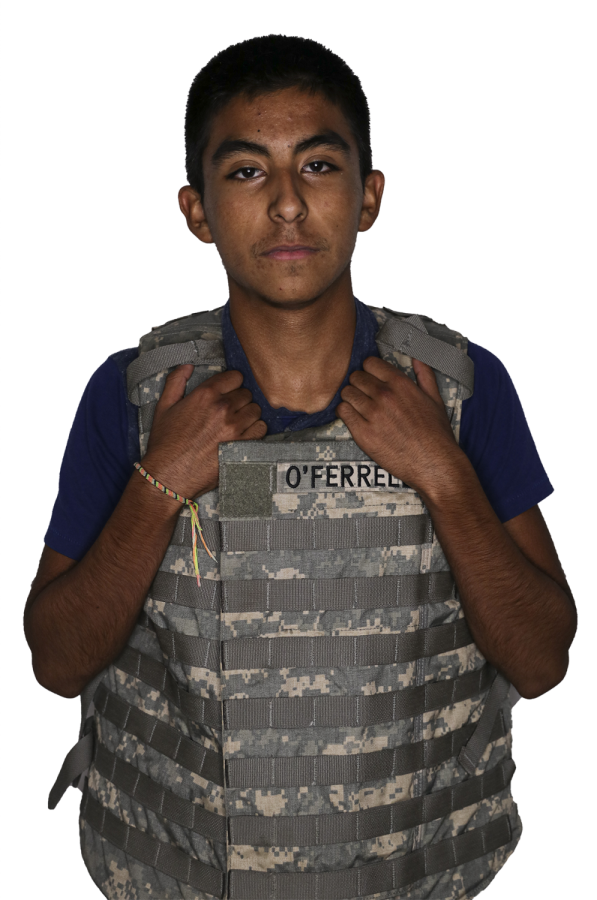
My dad was in the army for 15 years and so was his dad and [my dad’s dad] also.
I’ve wanted to be in the army for a long time because when I came here, [my dad] had been in the army. I wanted to be more like him. I just grew up knowing and thinking that Veterans Day was very important.
A lot of people sacrificed their lives when they didn’t have to and they did it for us. I think with the people that don’t live with a veteran, they really do just see it as a day and they give thanks, but for me, I live with one so it’s just bigger and different.
Personally, I think it’s important to me because [veterans] did give up their lives when they didn’t have to and I see that. I think that they are very brave and I look up to them for that.
From what I’ve seen last year in the school when we had the Veterans Day assembly, a lot of people didn’t really care for it. A lot of them were saying ‘This is dumb’ or ‘We don’t really want to go to this’ and a lot of people didn’t even show up for it. So I think now [people’s value for Veterans Day] is not as big as it was during maybe World War II. It obviously was very important when we were at war.
I think now that the wars are a little bit more low profile and people don’t know much about them and they aren’t on the news as much, that is probably why. We aren’t exposed to it anymore. A lot of people don’t stand up for [National Anthem and the Pledge]. I think the reason behind that is because they just have the wrong idea of it and the wrong meaning. They think that we are standing up for the president and all of that, but they don’t understand that we really aren’t standing for the president.
We are standing for the people that gave up their lives for the flag, all of those people, not the president.
What PHS students know about veterans
Words by Joseph Lee Photos by Hannah Abarca and Beth Blessent Graphics by Elle Burgess
